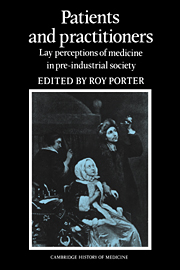Book contents
- Frontmatter
- Contents
- 1 Introduction
- 2 Murders and miracles: Lay attitudes towards medicine in classical antiquity
- 3 Puritan perceptions of illness in seventeenth century England
- 4 In sickness and in health: A seventeenth century family's experience
- 5 Participant or patient? Seventeenth century childbirth from the mother's point of view
- 6 Piety and the patient: Medicine and religion in eighteenth century Bristol
- 7 Cultural habits of illness: The Enlightened and the Pious in eighteenth century Germany
- 8 ‘The doctor scolds me’: The diaries and correspondence of patients in eighteenth century England
- 9 Prescribing the rules of health: Self-help and advice in the late eighteenth century
- 10 Laymen, doctors and medical knowledge in the eighteenth century: The evidence of the Gentleman's Magazine
- 11 The colonisation of traditional Arabic medicine
- Index
4 - In sickness and in health: A seventeenth century family's experience
Published online by Cambridge University Press: 19 October 2009
- Frontmatter
- Contents
- 1 Introduction
- 2 Murders and miracles: Lay attitudes towards medicine in classical antiquity
- 3 Puritan perceptions of illness in seventeenth century England
- 4 In sickness and in health: A seventeenth century family's experience
- 5 Participant or patient? Seventeenth century childbirth from the mother's point of view
- 6 Piety and the patient: Medicine and religion in eighteenth century Bristol
- 7 Cultural habits of illness: The Enlightened and the Pious in eighteenth century Germany
- 8 ‘The doctor scolds me’: The diaries and correspondence of patients in eighteenth century England
- 9 Prescribing the rules of health: Self-help and advice in the late eighteenth century
- 10 Laymen, doctors and medical knowledge in the eighteenth century: The evidence of the Gentleman's Magazine
- 11 The colonisation of traditional Arabic medicine
- Index
Summary
The sufferer's experience of illness, although a relatively recent subject of historical research, is not difficult to investigate. In all ages, people have been fascinated by illness. Thus, diaries and autobiographies are replete with descriptions of the disorders suffered by both writers and their family members, friends and acquaintances. Seventeenth century England was rich in such documents. However, historians who have used these source materials have generally been interested in such subjects as politics, religion, economics and family relationships, leaving the great wealth of medical information they contain virtually untapped.
The extent to which diaries reflect general experience is frequently and deservedly questioned. The seventeenth century diarists whose writings have survived were members of the middle and upper classes. Furthermore, diarists and autobiographers are unusual in any age, feeling a need most people never feel to commit thoughts and experience to paper. Their attitudes and behaviour can be taken as representative neither of general experience nor of the experience of others at their social level.
Nonetheless, such records of unique, personal experience are invaluable to the historian, providing as they literally do, a voice from the grave which can make the past live as no other source can. And the fact that the experiences they describe may not be representative is, perhaps, insignificant, since each individual's experience is to a large extent unique, whether or not he or she describes it in a diary.
- Type
- Chapter
- Information
- Patients and PractitionersLay Perceptions of Medicine in Pre-industrial Society, pp. 101 - 128Publisher: Cambridge University PressPrint publication year: 1986
- 3
- Cited by



